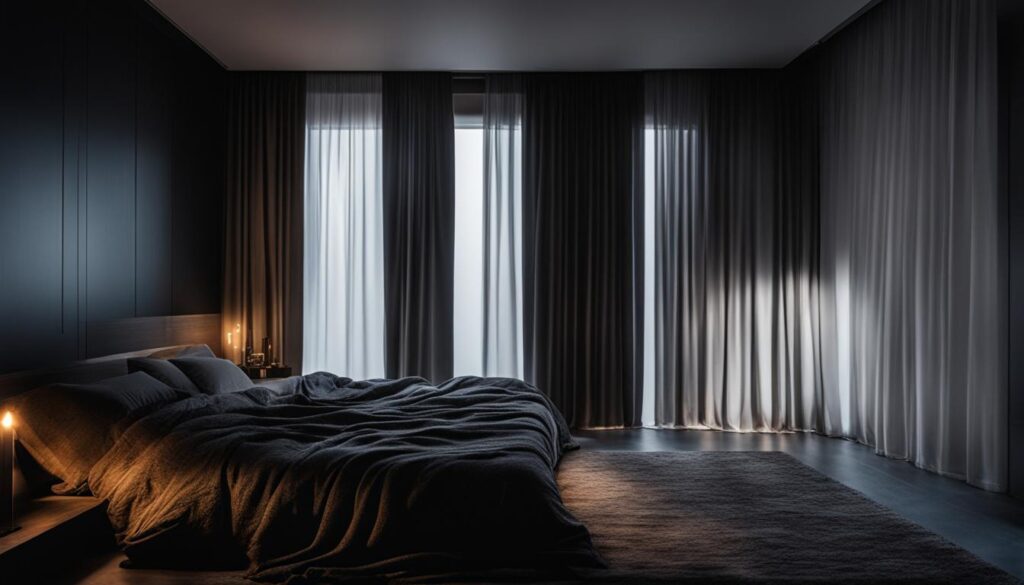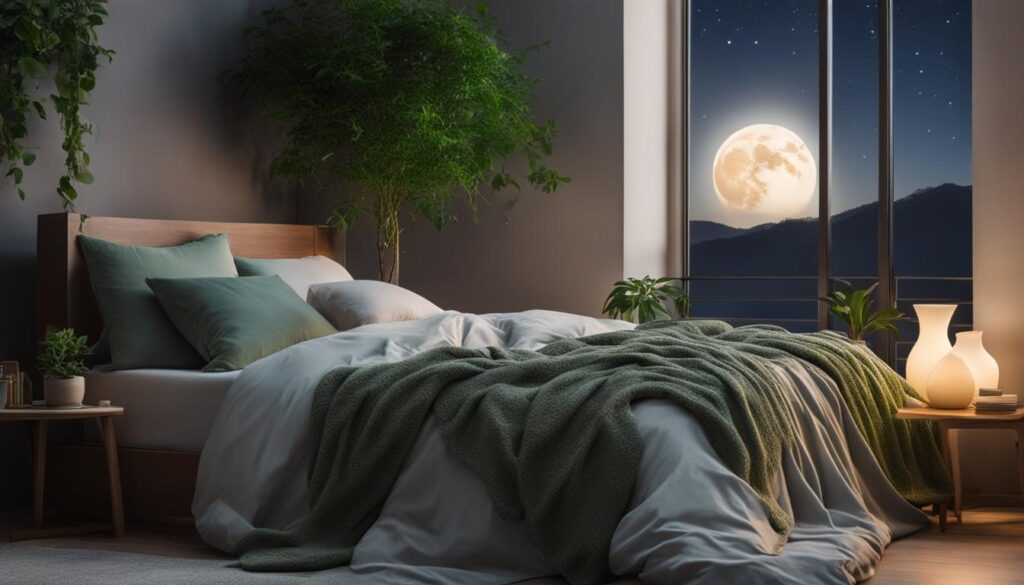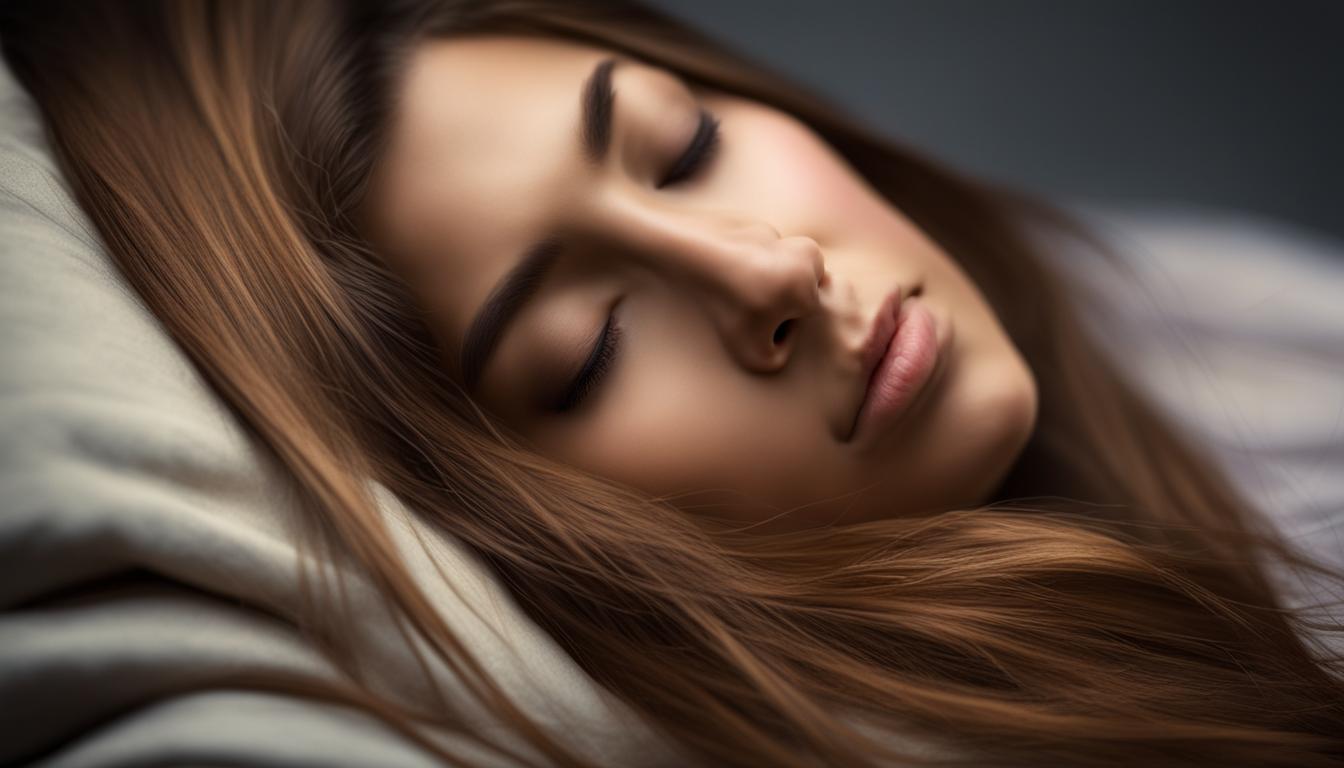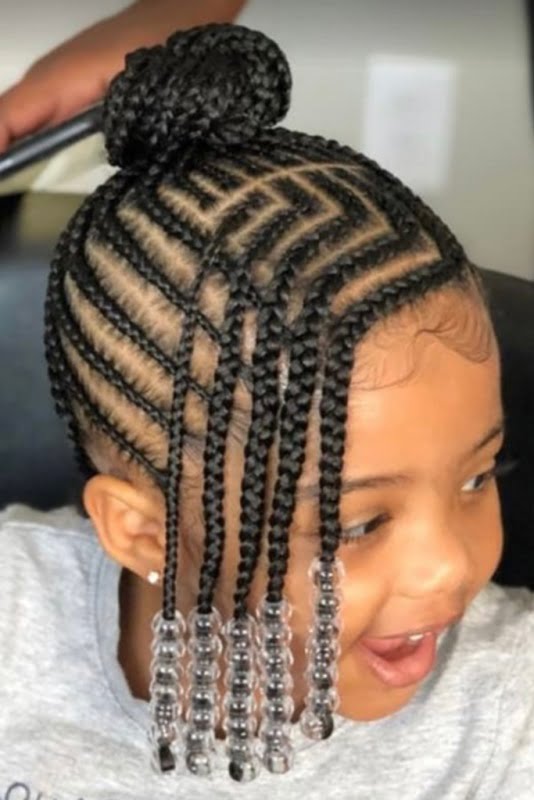Does Sleeping Thicken Hair?
Lack of quality sleep can have a significant impact on various aspects of our health, including our hair. Many of us wonder if sleep plays a role in hair thickness and growth. In this article, I will explore the relationship between sleep and hair health, and whether sleeping can actually promote hair thickening.
Our hair is constantly going through a growth cycle, with hair follicular stem cells (HFSCs) playing a crucial role in this process. These cells are responsible for producing new hair strands, and their health is essential for maintaining thick and voluminous hair. Sleep deprivation and stress-related sleep disturbances can disturb the functioning of HFSCs, potentially leading to hair loss or thinning.
But fear not, there are natural ways to improve hair thickness through sleep. By making a few adjustments to your sleep habits and environment, you can potentially enhance hair growth and promote thicker, healthier hair.
Key Takeaways:
- Quality sleep is crucial for the health of hair follicular stem cells (HFSCs) that influence hair thickness and growth.
- Caffeine intake can disrupt sleep and hinder hair growth. Limit or eliminate caffeine consumption at least 4-6 hours before bedtime.
- Excessive exposure to blue light from electronic screens can interfere with sleep patterns and affect hair thickness. Use blue light blockers to reduce exposure.
- Investing in blackout curtains can create a dark sleep environment and improve sleep quality, potentially benefiting hair thickness.
- Going to bed before 10 pm or earlier allows the body to produce melatonin, a hormone essential for rest and restoration, supporting hair growth.
The Impact of Caffeine on Sleep and Hair Thickness
Excessive consumption of caffeine can have detrimental effects on both sleep quality and hair thickness. Caffeine, a stimulant found in many beverages such as coffee, tea, and energy drinks, can disrupt the body’s natural sleep-wake cycle, leading to sleep disturbances and potential hair growth issues. It is important to understand the impact of caffeine on sleep and how it can affect the thickness of your hair.
When consumed in high amounts, caffeine stimulates the central nervous system, making it difficult for the body to relax and enter a state of restful sleep. This disruption in sleep patterns can disrupt the hair growth cycle, as sleep is essential for the proper functioning of hair follicles. As a result, hair thickness may be compromised.
To promote better sleep and support hair thickness, it is advisable to reduce or eliminate caffeine intake several hours before bedtime. This allows the body enough time to process and metabolize the caffeine, minimizing its effects on sleep quality. Choosing caffeine-free alternatives, such as herbal teas or decaffeinated beverages, can also be beneficial in maintaining a healthy sleep routine and promoting optimal hair growth.
The Role of Caffeine in Hair Growth
While excessive caffeine consumption can have negative effects on sleep and hair thickness, it is worth noting that topical application of caffeine has shown potential benefits for hair growth. Studies have suggested that caffeine can stimulate hair follicles and promote hair shaft elongation, potentially contributing to thicker and healthier hair. However, further research is needed to fully understand the effects of caffeine on hair growth and to develop targeted treatments.
The Role of Blue Light in Sleep and Hair Health
Excessive exposure to blue light can have detrimental effects on both sleep patterns and hair health. Blue light is emitted from electronic screens such as smartphones, tablets, and computers, and it can interfere with the production of melatonin, a hormone essential for rest and relaxation. When melatonin levels are disrupted, it can lead to difficulty falling asleep and staying asleep, ultimately affecting the quality of sleep.
Studies have shown that blue light exposure before bedtime can prolong the time it takes to fall asleep and decrease overall sleep duration. This disruption in sleep can have a cascading effect on hair health, as quality sleep is crucial for the rejuvenation and repair of hair follicles.
To reduce the negative impact of blue light on sleep and hair thickness, there are several strategies that can be implemented. One effective method is to limit screen time before bed, especially in the last hour leading up to sleep. This can help the body naturally wind down and prepare for restful sleep.
Additionally, blue light-blocking glasses or screen filters can be utilized to minimize exposure to blue light from electronic devices. These accessories filter out the harmful blue light wavelengths, allowing for better sleep quality and potentially promoting healthier hair thickness.
The Benefits of Reducing Blue Light Exposure:
- Improved sleep quality
- Potential promotion of hair thickness
- Enhanced overall well-being
By reducing blue light exposure and prioritizing sleep, individuals can optimize their hair health and contribute to a healthier appearance.
Enhancing Sleep Quality with Blackout Curtains
Creating a dark and peaceful sleep environment is crucial for optimizing sleep quality and promoting overall well-being. One effective way to achieve this is by investing in blackout curtains. Blackout curtains are designed to block out external light sources, reducing light exposure during sleep and creating a conducive atmosphere for restful slumber.
Light can have a significant impact on sleep quality, as even small amounts of light can interfere with the body’s natural circadian rhythm. Exposure to light during sleep can disrupt the production of melatonin, the hormone responsible for regulating sleep and wake cycles. By reducing light exposure with blackout curtains, you can help regulate your body’s sleep-wake cycle and potentially improve the thickness and health of your hair.
Blackout curtains not only block out natural light but also minimize the intrusion of artificial light sources, such as streetlights or electronic devices. This is particularly important in today’s modern society, where many individuals have digital screens in their bedrooms. By reducing the exposure to blue light emitted by these devices, blackout curtains can help mitigate the negative effects of blue light on sleep quality and potentially promote hair thickness.
“Investing in blackout curtains can create a dark and conducive sleep environment, promoting better sleep quality and potentially supporting hair thickness.”
In summary, incorporating blackout curtains into your sleep routine can have a positive impact on sleep quality and potentially promote hair thickness. By reducing light exposure during sleep, blackout curtains help regulate the body’s sleep-wake cycle and support the production of melatonin, essential for restful sleep. Investing in blackout curtains is a simple yet effective way to enhance sleep quality and improve overall hair health. So, consider making this small change to your sleep environment to reap the benefits of a restful night’s sleep and potentially boost your hair thickness.

The Optimal Bedtime for Hair Health
Getting enough quality sleep is not only essential for overall well-being but also plays a significant role in maintaining healthy hair. The time at which we go to bed can have an impact on the growth and thickness of our hair. It is important to understand the optimal bedtime for sleep to support hair health.
Going to bed before 10 pm or earlier is considered ideal for promoting optimal sleep and hair growth. Around 10 pm, our body starts producing melatonin, a hormone crucial for rest and restoration. This hormone not only helps regulate our sleep-wake cycle but also influences hair growth. By prioritizing an early bedtime, we allow our body to produce melatonin and promote the overall health of our hair.
When we stay up late and expose ourselves to artificial light, such as from electronic devices or bright overhead lights, it can disrupt our sleep-wake cycle. This disruption can lead to increased levels of cortisol, a stress hormone that can negatively impact the production of melatonin and hinder hair growth. By establishing an optimal bedtime and avoiding excessive exposure to light, we can improve the quality of our sleep and support the thickness of our hair.
A consistent and adequate sleep schedule is essential for ensuring the health of our hair. By prioritizing an early bedtime, reducing exposure to artificial light, and creating a sleep-friendly environment, we can optimize the quality of our sleep and potentially enhance the thickness of our hair. Remember, a good night’s sleep is not only restorative for the body but also beneficial for maintaining healthy and vibrant hair.
The Influence of Late-Night Eating on Sleep and Hair Thickness
When it comes to promoting hair thickness and overall hair health, many factors come into play, including late-night eating habits. The timing of our meals can have a significant impact on our sleep quality and digestion, which, in turn, can affect hair growth. Let’s explore the relationship between late-night eating and sleep disruption, as well as the impact of digestion on hair growth.
While enjoying a late-night snack may seem harmless, it can actually disrupt our sleep patterns. When we eat close to bedtime, our bodies divert energy towards digestion instead of rest and repair. This can lead to poor sleep quality, leaving us feeling groggy and affecting hair growth. Prioritizing a gap between meals and sleep allows our bodies to focus on rejuvenation, potentially promoting healthier hair thickness.
Studies have shown that late-night eating can negatively impact our sleep cycles, leading to sleep disruption and potential hair thinning. By giving our bodies sufficient time to digest food before we sleep, we allow for optimal rest and restoration, which can contribute to improved hair thickness.
The Importance of Healthy Nighttime Eating Habits
Establishing healthy nighttime eating habits can benefit not only our sleep but also our hair thickness. It’s advisable to have dinner at least two to three hours before bedtime, allowing ample time for digestion. Opt for lighter, nutrient-rich meals that won’t overburden your digestive system. Avoid heavy, greasy, or spicy foods, as they can increase the likelihood of acid reflux or indigestion, both of which can disrupt sleep and hinder hair growth.
- Choose protein-rich snacks like a handful of nuts or a small serving of Greek yogurt, which can promote hair health.
- Include foods rich in vitamins and minerals, such as leafy greens, berries, and lean proteins, to support hair growth.
- Avoid sugary or processed snacks as they can lead to blood sugar spikes and crashes, affecting sleep quality.
Incorporating these healthy nighttime eating habits into our routine can help support our sleep quality and hair thickness. By giving our bodies the necessary time to digest and rejuvenate, we can optimize our hair health and overall well-being.

The Importance of Sleep for Hair Growth and Overall Health
Quality sleep is not only essential for our overall health and well-being but also plays a significant role in promoting hair growth and maintaining hair health. When we sleep, our bodies undergo vital restorative processes that contribute to the growth and regeneration of various tissues, including our hair.
During sleep, the production of human growth hormone (HGH) is at its highest, which helps in maintaining and repairing our skin, muscles, and bones. HGH also plays a crucial role in hair growth by stimulating the hair follicles and promoting the production of new hair cells. Lack of sleep can disrupt this hormonal balance, potentially leading to hair thinning and loss.
Sleep deprivation can also have a negative impact on our overall hormonal balance, causing imbalances in stress hormones such as cortisol. Elevated cortisol levels can contribute to hair loss and thinning. In addition, inadequate sleep can increase systemic inflammation and oxidative stress in the body, which can further affect hair follicles and hinder their ability to produce thick, healthy hair.

It is important to prioritize sleep and establish healthy sleep habits to support hair growth and overall health. By following a consistent sleep schedule, creating a sleep-friendly environment, and practicing relaxation techniques before bed, we can improve both the quality and quantity of our sleep, allowing our bodies to engage in the restorative processes necessary for promoting hair thickness and vitality.
Remember, sleep is not only a time to rest and recharge but also a crucial factor in maintaining healthy hair and overall well-being. Taking steps to prioritize sleep can have a positive impact on our hair growth journey and contribute to a healthier, more vibrant appearance.
Conclusion
To achieve thicker and healthier hair, it is important to recognize the significant role that quality sleep plays in hair health. Poor sleep habits can lead to hair loss and hinder the natural growth cycle. However, by making a few simple changes to your sleep routine, you can improve the thickness of your hair and promote overall hair health.
Firstly, limiting your caffeine intake is essential. Consuming high amounts of caffeine can disrupt sleep and affect the quality of your rest, potentially hindering hair growth. It is advisable to avoid caffeine intake 4-6 hours before bedtime to ensure uninterrupted sleep and support hair thickness.
Additionally, reducing your exposure to blue light can have a positive impact on both sleep quality and hair thickness. Excessive exposure to blue light, emitted from electronic screens, can disrupt sleep patterns and interfere with the production of melatonin, a hormone essential for rest and relaxation. Using blue light blockers, such as glasses or screen filters, can help filter out blue light and promote healthier sleep, benefiting hair volume.
Lastly, creating a conducive sleep environment is crucial. Investing in blackout curtains can help reduce light exposure during sleep, including disruptive blue light. By creating a dark sleep environment, you can promote better sleep quality and potentially support hair thickness. Remember, getting enough sleep and prioritizing rest is not only beneficial for your overall well-being but also for the thickness and health of your hair.
FAQ
Does lack of quality sleep affect hair thickness?
Yes, lack of quality sleep can be a trigger for hair loss as it can cause stress-related sleep deprivation. Sleep is crucial for the health of hair follicular stem cells (HFSCs) that play a role in the hair growth cycle.
How does caffeine intake affect sleep and hair thickness?
Consuming high amounts of caffeinated drinks can disrupt sleep and affect the quality of sleep, potentially hindering hair growth. Caffeine has a stimulating effect and can delay the body’s internal clock, leading to sleep disturbances.
What is the impact of blue light on sleep and hair health?
Excessive exposure to blue light, emitted from electronic screens, can disrupt sleep patterns and interfere with the production of melatonin, a hormone essential for rest and relaxation. This disruption can affect hair thickness.
How can blackout curtains improve sleep quality and potentially support hair thickness?
Investing in blackout curtains can create a dark and conducive sleep environment. These curtains block out external light, including blue light, promoting better sleep quality and potentially supporting hair thickness.
What is the optimal bedtime for hair health?
Going to bed before 10 pm or earlier is ideal for optimal sleep and hair growth. Around 10 pm, the body starts producing melatonin, a hormone crucial for rest and restoration. If the body is still active and exposed to light, cortisol levels increase and disrupt the sleep-wake cycle.
How does late-night eating impact sleep and hair thickness?
Eating right before bed can affect sleep quality and hinder hair growth. The digestive process requires energy, diverting it away from rest and repair, which sleep is intended for. Avoiding late-night meals allows the body to focus on restoration, potentially promoting healthier hair thickness.
Why is quality sleep important for hair growth and overall health?
Quality sleep is essential for overall health, and it plays a significant role in hair growth. Sleep allows for the production of human growth hormone, necessary for maintaining and repairing skin, muscles, and bones. It also impacts the production of melatonin, which has been linked to hair growth. Sleep deprivation can lead to hormonal imbalances, stress on the body, and potential hair loss.
Can sleeping thicken hair?
Yes, sleeping can potentially promote hair thickening by improving the quality of sleep. Factors like limiting caffeine intake, reducing blue light exposure, using blackout curtains, maintaining an optimal bedtime, and avoiding late-night meals can all contribute to enhancing sleep quality and potentially supporting hair thickness.







